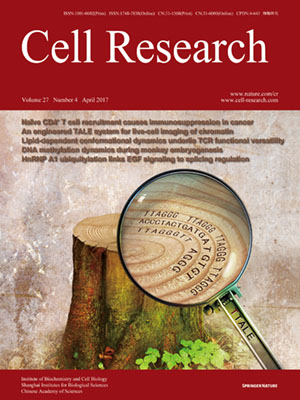
Volume 27, No 4, Apr 2017
ISSN: 1001-0602
EISSN: 1748-7838 2018
impact factor 17.848*
(Clarivate Analytics, 2019)
Volume 27 Issue 4, April 2017: 590-593 | Open Access
LETTERS TO THE EDITOR
Single-cell exome sequencing identifies mutations in KCP, LOC440040, and LOC440563 as drivers in renal cell carcinoma stem cells
Chong Li1,2,3,*, Song Wu4,*, Zhao Yang5,*, Xiaolong Zhang4,*, Qi Zheng6, Ling Lin6, Zexiong Niu6, Ruiqiang Li6, Zhiming Cai4 and Lei Li1
1Department of Urology, The First Affiliated Hospital of Xi'an Jiaotong University, Xi'an, Shanxi 710061, China
2Chinese Academy of Sciences Protein Science core facility center, Institute of Biophysics, Chinese Academy of Sciences, Beijing 100101, China
3Beijing Jianlan Institute of Medicine, Beijing 100190, China
4The Affiliated Luohu Hospital of Shenzhen University, Shenzhen Luohu Hospital Group, Shenzhen, Guangdong 518000, China
5CAS Key Laboratory of Pathogenic Microbiology and Immunology, Institute of Microbiology, Chinese Academy of Sciences, Beijing 100101, China
6Novogene Bioinformatics Institute, Beijing 100083, China
Correspondence: Lei Li,(lilydr@hotmail.com)
Renal cell carcinoma (RCC) accounts for ~3% of adult malignancies and 90%-95% of kidney neoplasms1. Metastatic disease is usually resistant to radiation and chemotherapy. Immunotherapy shows limited response rates of 15% to 20%2. Cancer stem-like cells (CSCs) are key players in RCC initiation, development and resistance to therapy3. Previous studies have shown that RCC is a genetically distinct adult carcinoma with a relatively low mutation rate4. Sequencing analyses have revealed that some common somatic mutations are shared among RCC patients5. Recently, single-cell exome sequencing has been used to evaluate somatic mutations in many tumor types6. However, a systematic effort applying this new technique to identify key driver genes in the CSCs of RCC has not been made.
10.1038/cr.2016.150
FULL TEXT | PDF
Browse 1881


